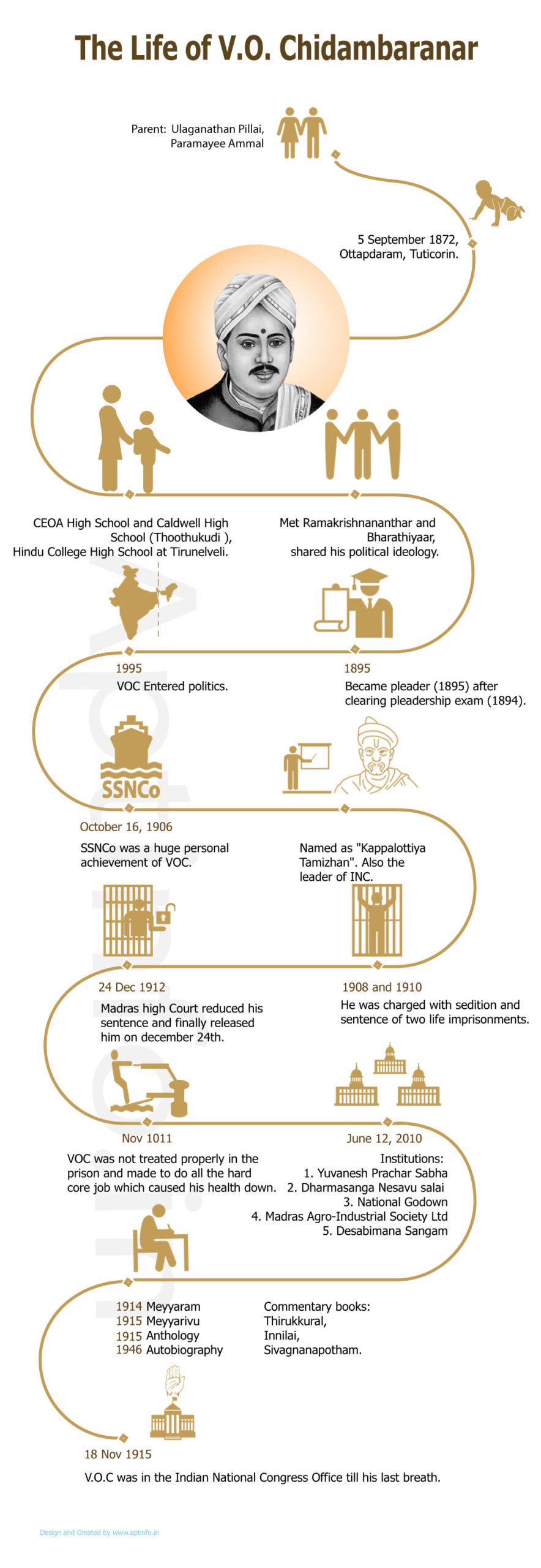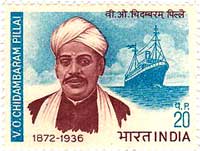Indian Freedom fighter and barrister (Kapalottya Tamilzhan)

Birth
V.O Chidambaram Pillai was born to Ulaganathan Pillai and Paramayee Pillai on 5 September 1872 in Ottapidaram of Tuticorin District in Tamilnadu.
School life
He studied in CEOA High School and later in Caldwell High School at the Thoothukudi. Then he moved to Hindu College High School in Tirunelveli, to continue his studies. Later in the year 1894, he passed his pleadership exam and came back to Ottapidaram in 1895 to become a successful pleader.
What induced V.O.C to fight for freedom?

Chidambaram got a chance to meet a saint of Swami Vivekananda Ashram named Ramakrishnananthar. He only advised Chidambaram, “to make something for the country”. Later Chidambaram met the tamil poet Bharathiyar who admitted his political ideas. From this, two of them became close friends.
Establishment of SSNo and Political Participation
During 1905, V.O Chidambaram stepped into politics after the partition of Bengal. Within one year that is by 1905, Chidambaram got the support from the businesspersons and tycoons of Tuticorin and Tirunelveli for the idea to start “Swadeshi Steam Navigation(SSNCo)” which is the Swadeshi merchant Shipping site.
This first Indian Shipping Company began on October 16, 1906 was the masterpiece of VOC. To raise the capital for the company, he travelled throughout India to sell the shares. For this he sweared “ I will return with Ships. Else I will overturn into the sea”. Later, the ships from his company made routine service against the British Traders opposition and the British Government. For this brave act, he was known as “Kappalotiya Tamizhan” meaning Tamil Helmsman.
Coral Mill Strike
Chidambaram made a speech among the Coral Mill workers to oppose heavy working conditions and lower salary on 23rd February 1908. After four days, Coral mill workers gone to make a strike. This was led by Chidambaram and Siva. Chidambaram assured the publicity of the strike and got the support. This strike went for nine days , which resulted in the salary hike and good treatment.
Arrest of V.O Chidambaram
V.O Chidambaram was a disciple of the freedom fighter Bala Gangadhar Tilak. In 1908, Chidambaram spoke at a celebration held for Bipin Chandra Pal’s release. For which, he and his friend Subramanya Siva were insisted by a British officer to not take part in the further political activities. As Chidambaram ignored this condition, he was imprisoned with his friend Siva. As a result, a general strike in Thootukudi was announced which was the first political strike in India. With this, the British imprisoned him in Central Jail from July 1908 to December 1910. In the prison, he was tortured to do hard work like a convict which resulted in his health issues. Finally, he was released in the month of December 1912. In 1911, his shipping company was liquidated.
Gandhi Kanakku
After he moved to Chennai, V.O.C and Gandhi had a long correspondence through letters from 1915 to 1920. Some of Indian South Africans collected money to help Chidambaram and transferred through Gandhi. On this, Gandhi sent a postcard to Chidambaram but without any money. This incident gave birth to new term “Gandhi Kanakku” in South India, which refers the debt that cannot be paid off.
Chidambaram Congress Affairs
Due to differences with Gandhi, Chidambaram left the INC (Indian National Congress) in 1920. After he received back the pleadership license, Chidambaram moved to Kovilpatti from Coimbatore and practiced to be an advocate. During 1927, he joined again the Congress Party, citing the positive changes in the Congress.
V.O.C Books
Later in 1929, after he shifted to Thootukudi, Chidambaram took time for writing books and publishing those books.
The Meyyaram(1914), Meyyarivu(1915), Anthology(1915) and Autobiography(1949) were the books written by him. Also he had written commentary books like Thirukkural, Innilai and Sivagnanpotham.
Institutions of V.O.C
Yuvanesh Prachar Sabha, Dharmasanga Nesavu Salai , National Godown, Desabimana Sangam and Madras Agro Industrial Society were the Institutions established by him.
Death
On 18th November 1936, V.O Chidambaram died.
